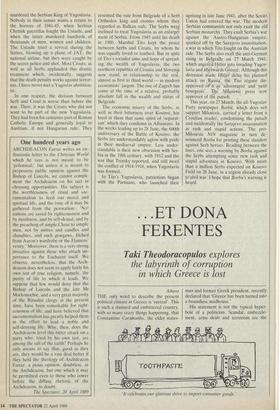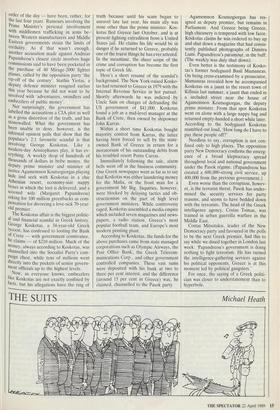...ET DONA FERENTES
Taki Theodoracopulos explores the labyrinth of corruption in which Greece is lost
Athens THE only word to describe the present political climate in Greece is 'surreal'. This is such a stunned and embittered country. with so many crazy things happening, that Constantine Carakiarilis, the elder states-
man and former Greek president, recently declared that 'Greece has been turned into a boundless madhouse.'
His statement is not the typical hyper- bole of a politician. Scandal, embezzle- ment, arms deals and terrorism are the 'It celebrates our glorious drive to import consumer goods.: order of the day — have been, rather, for the last four years. Rumours involving the Prime Minister's personal involvement With middlemen trafficking in arms be- tween Western manufacturers and Middle Eastern governments strain the limits of credulity. As if that wasn't enough, another accusation made against Andreas Papandreou's closest circle involves huge commissions said to have been pocketed in the purchase of 40 Mirage-2000 fighter planes, called by the opposition party 'the np-off of the century'. Stathis Yiotas, a deputy defence minister resigned earlier this year because he did not want to be involved with 'adventurers, swindlers and embezzlers of public money'. Not surprisingly, the government has labelled the accusations a CIA plot as well as a gross distortion of the truth, and has stonewalled. What the government has been unable to deny, however, is the informal opinion polls that show that the populace's 2:1 favourite scandal is that Involving George Koskotas. Like a modern-day Aristophanes play, it has ev- erything. A weekly drop of hundreds of thousands of dollars in bribe money, the deputy prime minister and minister of Justice Agamemnon Koutsogiorgas playing hide and seek with Koskotas in a chic Athenian resort, economy-size nappy boxes in which the loot is delivered, and a scorned wife (Margaret Papandreou) asking for 100 million greenbacks as com- pensation for divorcing a love-sick 70-year- old premier.
The Koskotas affair is the biggest politic- al and financial scandal in Greek history. George Koskotas, a 34-year-old Greek tycoon, has confessed to looting the Bank of Crete — with government connivance, he claims — of $210 million. Much of the money, always according to Koskotas, was channelled into the Socialist Party's cam- paign chest, while tens of millions went directly into the pockets of senior govern- ment officials up to the highest levels. • Now, as everyone knows, embezzlers like Koskotas are not exactly confined by facts, but his allegations have the ring of truth because until his scam began to unravel late last year, his main ally was none other than the prime minister. Kos- kotas fled Greece last October, and is at present fighting extradition from a United States jail. He claims his life would be in danger if he returned to Greece, probably one of the truest things he has ever uttered. In the meantime, the sheer scope of the crime and corruption has become the first topic of Greek life.
Here's a short resume of the scandal's background. The New York-raised Kosko- tas had returned to Greece in 1979 with the Internal Revenue Service in hot pursuit. Shortly afterwards he was indicted by Uncle Sam on charges of defrauding the US government of $41,000. Koskotas found a job as a mid-level manager at the Bank of Crete, then owned by shipowner John Karras.
Within a short time Koskotas bought majority control from Karras, the latter having been forced to sell by the state- owned Bank of Greece in return for a moratorium of his outstanding debts from his troubled resort Porto Carras.
Immediately following the sale, alarm bells went off in the business community. One Greek newspaper went as far as to say that Koskotas was either laundering money for the Mafia, or the front man for a government Mr Big. Inquiries, however, were blocked by delaying tactics and ob- structionism on the part of high level government ministers. While controversy raged, Koskotas assembled a media empire which included seven magazines and news- papers, a radio station, Greece's most popular football team, and Europe's most modern printing plant.
According to Koskotas, the funds for the above purchases came from state managed corporations such as Olympic Airways, the Post Office Bank, the Greek Telecom- munications Corp., and other government controlled companies. These vast sums were deposited with his bank at two to three per cent interest, and the difference (around 15 per cent in Greece) was, he claimed, channelled to the Pasok party. Agamemnon Koutsogiorgas has res- igned as deputy premier, but remains in Parliament. And Greece being Greece, high chicanery is tempered with low farce. Koskotas claims he was ordered to buy up and shut down a magazine that had consis- tently published photographs of Dimitra Liani, Papandreou's paramour, in the buff. (The weekly was duly shut down).
Even better is the testimony of Kosko- tas's former bodyguard Basil Marnaneas. On being cross-examined by a prosecutor, Mamaneas revealed how he accompanied Koskotas on a jaunt to the resort town of Kifissia last summer, a jaunt that ended in a secluded street near the house of Agamemnon Koutsogiorgas, the deputy prime minister. From that spot Koskotas went on alone with a large nappy bag and returned empty-handed a short while later. According to the bodyguard Koskotas mumbled out loud, 'How long do I have to pay these people off?'
Needless to say, corruption is not con- fined only to high places. The opposition party New Democracy confirms the emerg- ence of a broad kleptocracy spread throughout local and national government under the Pasok regime. (Papandreou has created a 600,000-strong civil service, up 400,000 from the previous government.) Even worse than the corruption, howev- er, is the terrorist threat. Pasok has under- mined the security services for party reasons, and seems to have bedded down with the terrorists. The head of the Greek intelligence agency, Costas Tsimas, was trained in urban guerrilla warfare in the Middle East.
Costas Mitsotakis, leader of the New Democracy party and favoured in the polls to be the next Greek premier, had this to say while we dined together in London last week: 'Papandreou's government is doing nothing to fight terrorism. He has turned the intelligence-gathering services against his political opponents. Greece is at this moment led by political gangsters.'
For once, the saying of a Greek politi- cian was closer to understatement than to hyperbole.



































































 Previous page
Previous page